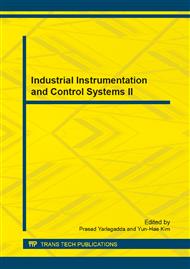[1]
Dean J. Experiences with MapReduce, an abstraction for large-scale computation. In: Proc. of the PACT 2006. Seattle: ACM Press, 2006. 16−20.
Google Scholar
[2]
Rizzo L. Effective erasure codes for reliable computer communication protocols. Computer Communication Review, 1997, 27(2): 24− 36.
DOI: 10.1145/263876.263881
Google Scholar
[3]
J. Plank and L. Xu, Optimizing Cauchy Reed-Solomon codes for fault-tolerant network storage applications, IEEE International Symposium on Network Computing and Applications, (2006).
DOI: 10.1109/nca.2006.43
Google Scholar
[4]
James S. Plank. A Tutorial on Reed–Solomon Coding for Fault-Tolerance in RAID-like Systems [J]. SOFTWARE—PRACTICE AND EXPERIENCE, SEPTEMBER 1997, VOL. 27(9), 995–1012.
DOI: 10.1002/(sici)1097-024x(199709)27:9<995::aid-spe111>3.0.co;2-6
Google Scholar
[5]
Reed I S, Solomon G. Polynomial codes over certain finite fields [J]. Journal of Society for Industrial and Applied Mathematics, 1960, 8(2): 300-304.
DOI: 10.1137/0108018
Google Scholar
[6]
Mu Jianjun, Lu Chengye, Wang Xinmei. About The Research and Progress On Erasure code[J]. Journal of Electronics & Information Technology, 2002, 09: 1276-1281.
Google Scholar
[7]
Roth R M. Lempel A. On MDS codes via Cauchy matrices [J]. IEEE Trans on Information Theory, 1989, 35(6): 1212-1319.
DOI: 10.1109/18.45291
Google Scholar
[8]
F. J. MacWilliams, N. J. A. Sloane, The Theory of Error-Correcting Codes, North Holland, Amsterdam, 1977, Chapter 11.
Google Scholar
[9]
J. Plank. Y. Ding. Note: Correction to the 1997 tutorial on Reed-Solomon Coding [J]. Software & Practice Experience, February 2005. 35(2): 189-194.
DOI: 10.1002/spe.631
Google Scholar
[10]
J. Plank, Luo J, Schuman C, et al. A performance evaluation and examination of open-source erasure coding library for storage [C]. Proc of the 7th USENIX Conf on File and Storage Technologies. Berkeley, CA: USENIX Association, 2009: 253-266.
Google Scholar
[11]
Xiangxue Li, Qingji Zheng, Haifeng Qian, Dong Zheng, Jianhua L, Toward optimizing cauchy matrix for cauchy reed-solomon code, Communications Letters, IEEE , vol. 13, no. 8, pp.603-605, August (2009).
DOI: 10.1109/lcomm.2009.090988
Google Scholar
[12]
Khan, R. Burns, J. Plank, W. Pierce, and C. Huang, Rethinking Erasure Codes for Cloud File Systems: Minimizing I/O for Recovery and Degraded Reads, in FAST, (2012).
Google Scholar


